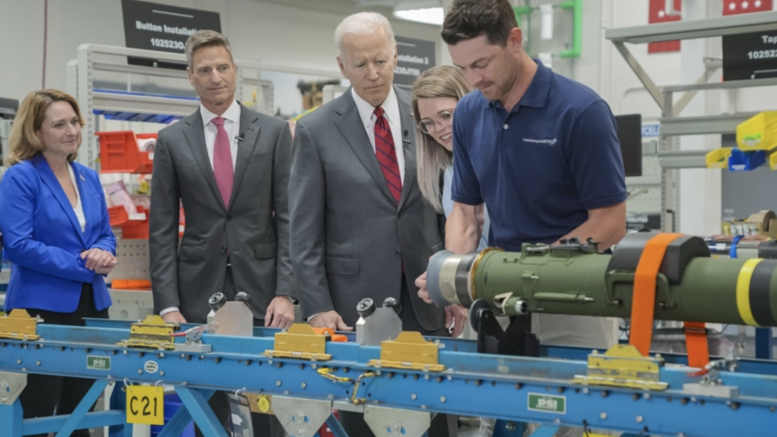Folks,
Greetings from Rio de Janeiro, where I am getting ready to ship out to the countryside to finish our documentary on the Landless Workers’ Movement (MST).
Donate a few bucks to help us finish our work.
$1,355 to Cover Unions for #CeasefireNow
Earlier today, Payday wrote to our readers to inform them that several subscribers had dropped their donations for our coverage of unions pushing for a ceasefire in Gaza.
In the last three hours, Payday has raised $1,355 from readers who want us to continue covering labor’s push for a ceasefire.
Donate to help us cover unions pushing for a ceasefire in Gaza. Please, sign up as one our 773 recurring donors today.
Missile Manufacturers Struggle to Find Workers
With US-backed wars raging in the Ukraine and Gaza, military leaders are complaining that the waitlist to buy missiles is years-long. Part of the reason that arms producers are struggling to produce missiles is that they can’t find enough workers. From the Wall Street Journal:
Kongsberg, which in addition to NASAMS (air defense missiles) also makes products including ship-based missiles and parts of F-35 fighter jets, has ramped up production. It moved to 24-hour, seven-day shifts and has workers in for some holidays when the factory would typically have been idled for maintenance. That still may not be enough.
The problem is that modern weapons are hugely complex, often requiring thousands of parts. Kongsberg, like most Western defense firms, designs and assembles its weapons systems but doesn’t manufacture most of the components. Over 1,500 suppliers contribute to the products at this factory. The Nasams supply chain alone consists of over a thousand companies and is built across two continents, with the U.S. defense contractor RTX, formerly known as Raytheon Technologies, supplying the radar and the actual missiles.
Pointing at a partially assembled Nasams, Lie said: “We are supplied by companies with their own supply chains, which in turn have their own supply chains, which have their supply chains, till it gets right down to the mine that digs up the basic resources.”
The defense industry is also grappling with a prolonged labor crunch, as it scrambles to find workers with niche skills, from software development to welding, and who are willing to endure lengthy security checks.
For more, check out the Wall Street Journal.
United Steelworkers Protest Sale of US Steel to Nippon Steel
Back home in Pittsburgh, the United Steelworkers are praising statements from the White House National Economic Council Director Lael Brainard that the sale of US Steel to Nippon Steel deserves “serious scrutiny.”
“U.S. Steel has made it clear, time and again, that its first and only priority is short-term financial gain for shareholders, even if this comes at the expense of workers, their communities and the nation’s lasting capacity to continue meeting its manufacturing needs,” said the Steelworkers Union in a statement. “The USW appreciates that the White House is taking a larger view, demonstrating once again the President’s unwavering commitment to domestic workers and industries.”
For more, check out the Labor Tribune.
Costco Owners Apologize to Workers After Union Drive
Last week Costco warehouse workers employed in Norfolk, Virginia voted to unionize. Now Costco’s corporate managers have written to their employees and apologized for not treating workers better.
“We’re not disappointed in our employees; we’re disappointed in ourselves as managers and leaders,” wrote outgoing CEO Craig Jelinek and then-President and now CEO Ron Vachris in a letter sent to employees this week. “The fact that a majority of Norfolk employees felt that they wanted or needed a union constitutes a failure on our part.”
For more, check out Business Insider.
Librarians, Fired for Refusing to Ban Books, Ask EEOC to Intervene
Last year the American Library Association recorded more than 700 attempts to ban books. Across the country librarians have been fired for refusing to ban books.
Now librarians are fighting back across the country; asking the EEOC and state civil rights commissions to intervene. In some states they have won major settlements and even reinstatements. Librarians say their victories are helping more librarians to fight back.
“It sends a message out that there are consequences – financial consequences – and we can put guardrails up against things like censorship and discrimination,” Iris Halperin, a lawyer representing librarians in three states told NPR. “What we’re seeing is these terminations are backfiring within the communities where they happen.”
Teachers Union Sues to Stop Pro-Public Transit Measure
Finally, a teachers union in New York City is suing to stop a measure that would allow “congestion pricing” on toll roads during rush hours. The measure is designed to encourage more people to take public transit.
However, the United Federation of Teachers in New York City is suing to stop the measure.
“Teachers, firefighters, police officers, EMS workers, sanitation workers and other public sector workers who are essential to the fabric of New York City would be forced to shoulder the burden of the MTA’s latest fundraising gambit,” the lawsuit claims.
Alright folks, that’s all for today. Keep sending tips, story ideas, comments and suggestions to [email protected]
Donate to help us keep covering labor in news deserts. Please, if you can, sign up as one of our 773 recurring donors today.
Love & Solidarity,
Melk

